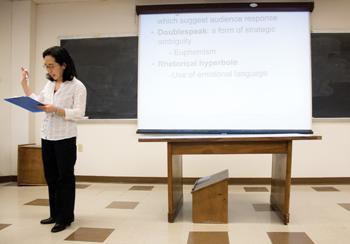In recent years, slacking college students have been able to find notes from missed classes on commercial note-trading Web sites. This type of service is springing up all over the Internet, but one problem arises with this occurrence – copyright infringement. Because of these new note-sharing trends, some University professors are beginning to copyright their lecture notes, Microsoft Powerpoint presentations and outlines to curb online note sharing. Federal copyright law only protects works that are “fixed” in a tangible means of expression. This includes works that are written and concrete such as written notes and Powerpoint presentations. But a lecture is not “fixed” because it is only the professor speaking and is not concrete. Common copyright law protects “unfixed” works, such as lectures as long as a professor can prove he or she is the author, and the state will protect the work. One popular Web site, NoteSwap.com, allows students to upload lecture notes in return for other students’ notes. Some students say they rely solely on services like NoteSwap and never attend class. Others say they use these sites to simply add to their own notes. Mass communication professor Laura Lindsay copyrights her lecture notes and opposes Web sites such as NoteSwap. Lindsay said professors usually collect their notes from a variety of sources, and lectures are usually taken from published articles or scholarly journals. “If the note taker misses this, it creates some ethical problems with attribution,” Lindsay said. “These errors are then duplicated and sold.”Eric Norman, University associate dean of students and director of Judicial Affairs, said a student’s punishment for posting copyrighted notes as their own depends on the context and situation of the misused work. Norman said any student can be charged with academic misconduct under the Code of Student Conduct if he or she violates University policies and copyright laws. The University policy states that publication in electronic format does not change the copyright issue. Students are responsible for being familiar with copyright laws and the University’s policies. The policy says that any copyrighted information may not be posted without permission of the copyright’s owner. Professors said these note-sharing services also affect class attendance. “Missing a class and relying on notes eliminates the context of the discussion,” Lindsay said. “It’s easy to spot the students who do this, and it shows in their performance.” Mass communication professor Felicia Song also copyrights her lecture outlines. She agreed the problem with note-trading Web sites is that students use them to replace class. Song said she is protecting her intellectual property from cyberspace and from other professors. “In many ways I’m not concerned with students violating copyright if it’s for another student,” Song said. “I’m more concerned about professors picking it up as their own.” Robert Selig, business management senior and NoteSwap user, said copyrights are unfair, especially with today’s technology. “I understand they’re promoting going to class,” Selig said. “But today, students don’t have to go to class and take notes themselves.” Some students see trading notes as a way of filling in the gaps in their notes. Evan Kolupski, construction management sophomore, said he does not think professors copyrighting their notes is a positive strategy to make students attend class. “[NoteSwap] is another study tactic,” Kolupski said. “You could learn something from someone else’s notes that could help you understand better.” Norman said in the end, it is the professor’s final decision what he or she believes should be the proper punishment for the student who violated the copyright law and University policy. NoteSwap states that any discovery of copyrighted materials will be removed from the Web site and may result in termination of the user’s account.
—-Contact Leslie Presnall at lpresnall@lsureveille.com
Professors copyright material to avoid note swapping
March 5, 2008

Felicia Song, mass communication professor, teaches class Monday in Lockett Hall. Song said she is more concerned about other professors using her lecture material than students sharing notes among each other.



